Craigslist scams: how to identify and avoid fraudulent listings
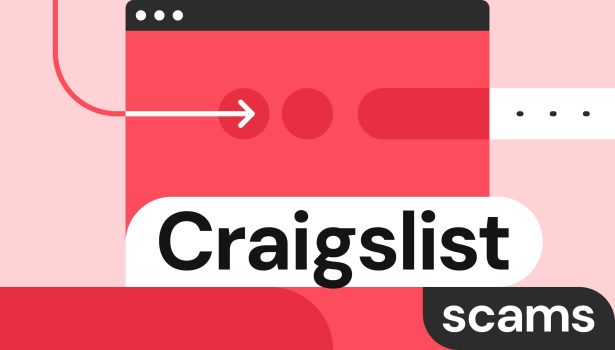
Founded in 1995, Craigslist is now among the top 20 most popular websites in the world. While it helps thousands of people connect locally through free postings about events, services, and items for sale, the platform has also given rise to various scams targeting both buyers and sellers.
Whether you’re on the buying or selling side, learn how to avoid falling for the many sneaky Craigslist scams out there—from the types of scams you need to know, to recognizing and stopping scammers in their tracks.
10 most common Craigslist scams to watch out for
Just like on any other popular marketplace, scams on Craigslist are numerous. As one of the oldest classified ads platforms, Craigslist has long been criticised for its lack of posting moderation and buyer protection. However, the platform only serves as a technology enabling advertisements—according to their terms of service, Craigslist is not responsible for the actions of their users. This means you should exercise extra caution and discretion when interacting with listings there.
How do Craigslist scams work? Similar to Facebook Marketplace scammers, those on Craigslist take advantage of the platform’s peer-to-peer nature of operations and minimal buyer protection. Hiding behind anonymous profiles and communicating via email, they can pose as legitimate buyers or sellers, invent stories to engage their targets, set too-good-to-be-true prices, and trick victims into sending advance payments or sharing personal information that can be later exploited for fraudulent purposes.
Here are the most common Craigslist scams you’re likely to encounter, along with the key red flags to help you spot scammers early.
Rental scams
Rental scams on Craigslist begin with fake or hijacked listings where scammers pose as landlords or property managers. These listings may feature no images at all or use photos stolen from other rental ads or websites. Property scammers typically ask for a deposit or rent upfront without allowing you to see the property first, claiming they’re out of town and pressuring you to wire money via instant money transfer apps like Zelle or Cash App.
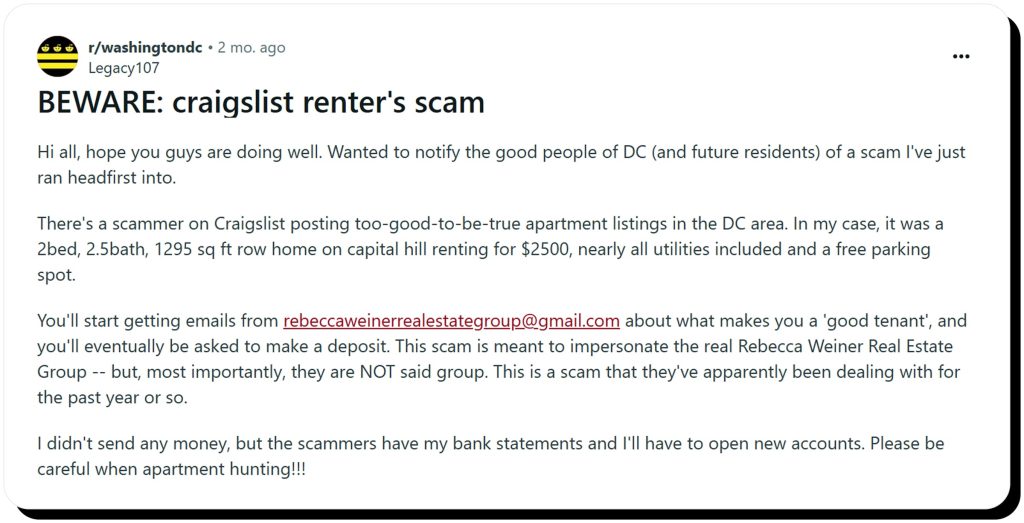
The red flag: If the rental price seems too good to be true and the “landlord” avoids meeting in person, it’s most likely a scam.
Job scams
Job scams are a variation of fake Craigslist listings, where scammers advertise very attractive job positions with high pay and minimal work or qualifications required. Once you start communicating with these “employers” or “recruiters”, they will likely ask you to pay upfront for training, equipment, or other associated costs, promising that these will be “refunded” later when you join the company. They may also ask for your banking information and Social Security number early on, which later can be exploited to steal your identity.
The red flag: “Employers” asking for money or sensitive personal information, no in-person interviews, and minimal job requirements compared to the high pay offered.
Craigslist car scams
Fake car listings are among the most common Craigslist buyer scams. Scammers typically list non-existent cars at unrealistically low prices, invent sob stories about why they can’t sell it in person (such as being deployed abroad with their military unit), and ask for payment via wire transfer or a gift card. Once they receive the payment, they disappear—no car ever being shipped to the unfortunate buyer.
In another version of a car scam, the “buyer” pushes the seller to buy a car title report from a third-party website that they “trust.” This site may be associated with the scammer and collect fees in exchange for some minimal resemblance of a legit report, or it may be a spoofed version of a legitimate website designed to collect the victim’s personal information.
The red flag: Selling a car at a price far below market value with a dramatic personal excuse, and refusing to meet in person.
Craigslist code scams
Scammers reach out to those who post on Craigslist pretending to be interested in the listing, then ask the post owner for the verification code sent to their phone number to “verify” they’re real. In reality, this is likely a Google Voice code that scammers use to create a fraudulent Google Voice account in the victim’s name.
In another version of this scam, bad actors impersonate Craigslist and send a text message to “verify” the sender’s phone number. Remember that Craigslist only verifies your phone number when a posting is created, any other instance is likely a scam.
The red flag: A supposed buyer asking to verify your identity with a code sent to your phone number.
Phishing scams
As email is the platform’s primary communication method, plenty of Craigslist scam emails are used for phishing.
Fake buyers may send automatic messages like “Is this still available?” and include a phishing link to a spoofed Craigslist login page to steal credentials. Scammers may also impersonate Craigslist support, sending emails that warn of suspicious account activity or ask you to “verify” your account to maintain access.
Scammers often create fake websites imitating Craigslist, payment platforms, or escrow services that appear legitimate but, in the background, steal all the information entered there. This information ranges from Craigslist credentials to credit card data, which can be used for to steal the victim’s funds.
The red flag: Emails or texts containing unusual links with misspelled URLs, prompts to fill out external forms, download attachments, or text back with a verification code or your email address.
Craigslist cashier’s check scam
This is one of the most common types of Craigslist scams for sellers, so if you’re selling something through the platform, beware of fake buyers offering to pay with a check.
In many cases, they’ll want to send a check overpaying for the item and suggest you use the difference to pay the courier, or deliberately send more money than agreed on, as if by mistake, and then ask you to refund the difference via some instant payment method. This tactic is also common in Venmo scams.

As it goes, the fraudulent check bounces later, and any money sent to the scammer will come out of the victim’s own pocket.
The red flag: Offering to pay with a check. Scammers love this payment method as it can take weeks to clear, giving them enough time to take the money (or the item) and disappear.
Counterfeit goods
Craigslist is a basic peer-to-peer marketplace, so it offers no buyer protection against counterfeit goods, unlike Poshmark that prevents scams with its luxury authentication service.
This means that there are numerous fake listings for counterfeit goods on Craigslist, and buyers will have no choice but to inspect them in person to avoid being scammed. Knowing this, counterfeit product sellers often push for advance payments and shipping options, only to disappear once they get the money or send you a fake item in a bait-and-switch type of scam.
The red flag: Extremely low prices on luxury items, images that appear stolen from other websites, sketchy communication, and excuses for not meeting in person.
Advance fee scams
An advance fee scam is an umbrella term for all kinds of scams involving an upfront payment, either in full or as a deposit, that later gets canceled by the sender, leaving the recipient with no money and, in many cases, without the item they gave away.
If you’re asked to pay before seeing the item or property in person, especially via irreversible payment methods like wire transfer or crypto, be cautious. Also beware of situations where “buyers” offer to pay with a cashier’s check (see above), as it’s a common form of scam too.
The red flag: Insisting on advance payments before allowing you to see the item or property.
Event ticket scams
Craigslist is often used to sell event tickets, especially those that are in high demand and get sold out quickly. Scammers take advantage of fans desperate to attend and post listings with fake or duplicate tickets, asking for an upfront payment. In this case, the buyer has no way to dispute the purchase and can only discover it was a scam at the event venue.
The red flag: Offering tickets below market price and insisting on an upfront payment.
Guaranteed seller scams
Some scammers try to emulate a sort of “verified” status on Craigslist to reduce suspicion and gain trust. But this “verification,” along with any “guaranteed seller” badge or status, is fake. No such status exists on Craigslist, just like there is no buyer protection or 100% money-back guarantee provided by the platform.
The red flag: Any seller claiming they’re a “guaranteed” or “verified” seller on Craigslist.
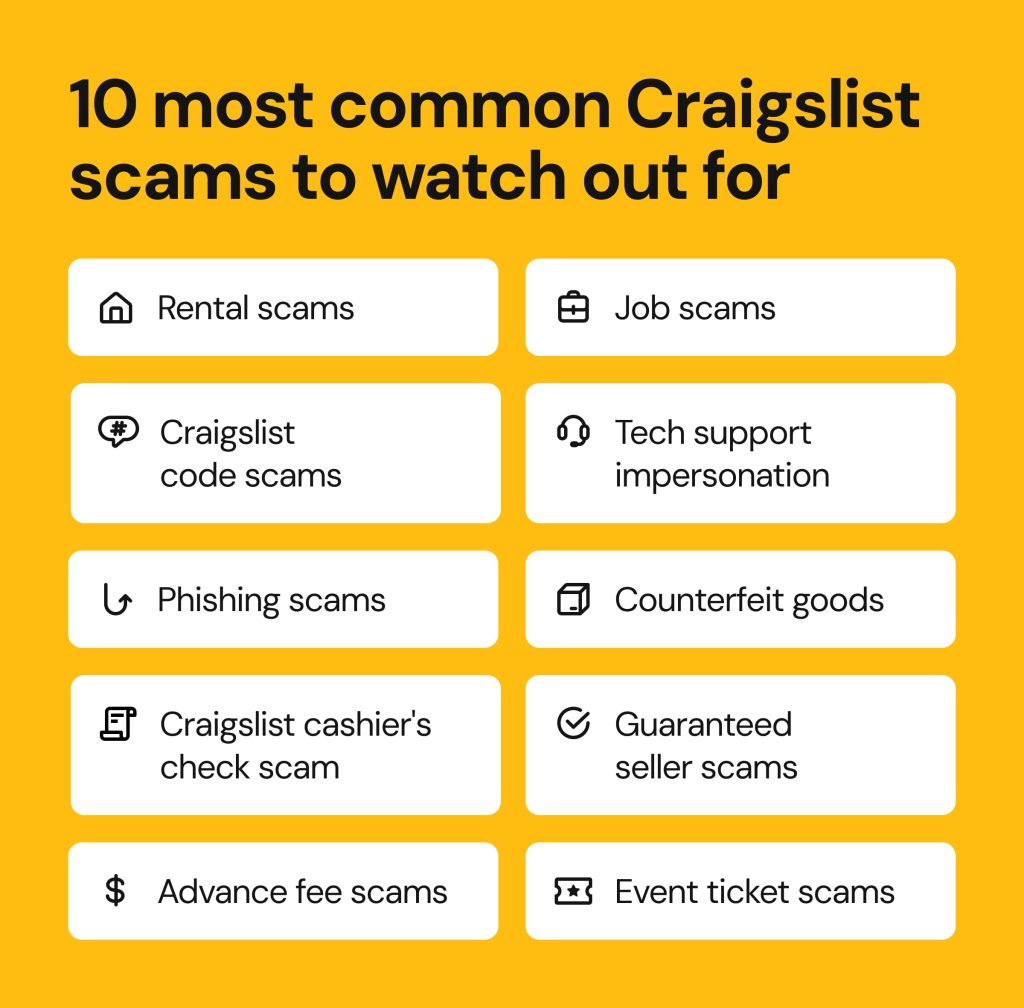
How to spot a scammer on Craigslist
Scammers on Craigslist constantly adapt and come up with new, more efficient ways to make people lower their guard. However, they still rely on common tactics that can help you spot a potential scam and block the attempt early.
Here’s how to identify a Craigslist scammer using the following telltale signs:
- Setting prices that are too good to be true, especially on typically expensive items like cars and luxury products.
- Sharing overly detailed stories explaining why they can’t meet in person or why a specific payment method must be used.
- Inventing complicated schemes involving extra money to pay a third party, such as a courier.
- Suggesting wire transfers, instant money transfer apps, or cryptocurrency as their only available payment option.
- Using pictures and listings stolen from other websites, which you can check by reverse-searching the images.
- Overpaying “by mistake” and asking you to refund the difference using another payment service.
- Suggesting a check as a payment method.
- Sending links to online payment pages that appear to be from reputable providers but include misspelled URLs.
- Mentioning any kind of Craigslist verification, either claiming to be verified sellers or asking you to verify yourself by sharing a code sent to your phone.
- Insisting on shipping the item instead of arranging a local pickup.
In addition, pay attention to how they communicate. If you receive lengthy messages with poor grammar and punctuation, excessive reassurances about safety and guarantees, pressure to act quickly, or overly emotional stories filled with details, there’s a strong chance you’re dealing with a scammer. In that case, stop communication immediately and flag the posting.
Tips to avoid Craigslist scams
Although Craigslist has become a staple of pop culture—including numerous comedies and sitcoms—running into a scam there is no joke. To avoid scams, Craigslist itself recommends dealing only locally and exchanging items for money in face-to-face meetups. In addition, you can follow these best practices to avoid falling into scam traps on Craigslist.
How to deal on Craigslist safely:
- Don’t send money without seeing the item first, even if the “seller” claims to be out of town.
- Never pay third parties, like couriers, on behalf of buyers.
- When selling expensive items, like a car, accept cash only or wait untill the payment fully clears in your bank account before transferring ownership to the buyer.
- Flag suspicious postings.
- In case of overpayment, don’t refund the difference unless the full payment has cleared in your account.
- Avoid buying from “guaranteed sellers” as this is a sign of fake seller accounts.
- Don’t use wire transfer, crypto, or peer-to-peer money transfer services like Zelle and Venmo, as these are difficult or impossible to dispute.
- If using escrow services, only use proven, legitimate companies, and research them independently before committing to a transaction.
- If applying for a job via Craigslist, verify the job posting on the company’s website and research the potential employer independently.
How to know if a job listing on Craigslist is legit:
A legit job listing on Craigslist will always include information that you can verify independently through a basic online search. This information should include:
- The company name and its physical address.
- A professional email address associated with the company’s domain, not a generic @gmail address.
- Clear job duties and requirements with reasonable pay matching the seniority level required.
Legitimate companies typically try to reach as many potential candidates as possible, so you’re likely to find the same job posting elsewhere—such as on the company’s website, LinkedIn, Indeed, and similar platforms.
No legitimate position will require any upfront payments, whether for recruiting services, training, or equipment. If you’re offered a job on Craigslist without any interview process, that’s a major sign of a scam.
How to protect your personal information:
- Never share verification codes or your Craigslist account credentials with anyone.
- Never click on links in Craigslist emails or enter your personal and payment information on third-party websites.
- Never share your personal and financial information with Craigslist users, such as payment card data, your home address, or Social Security number.
- Always check that the URL matches Craigslist.org as the only legitimate Craigslist domain.
- Don’t respond to suspicious emails or text messages, even if they allegedly come from Craigslist.
- Forward spam text messages to SPAM (7726).
- Monitor your digital footprint regularly to detect websites that publish your personal information without consent.
What to do if you’ve been scammed on Craigslist
While Craigslist itself doesn’t handle payments or assist in recovering your losses, you can still act quickly to minimize the damage and help relevant authorities track down the scammer.
Whether you’re a buyer or a seller on Craigslist, take the following steps if you’ve been scammed:
- Flag the listing and associated emails so Craigslist can remove the post.
- Report the scam to Craigslist using their contact details.
- If you clicked any links that you believe to be phishing ones, change your passwords immediately across all affected accounts.
- Collect evidence of what happened by taking screenshots of the listing, email correspondence, text messages, caller ID, payment confirmations, and any photos of fake items. This documentation will be instrumental in reporting the scam to law enforcement and anti-fraud authorities.
- Stop all communication and block the scammer, as they may continue trying to manipulate you into sending more information or money.
- If your payment information was compromised, report the incident to your bank or card issuer. They can block further transactions, close your account, and set up fraud alerts.
- File scam reports with the Federal Trade Commission and the Internet Crime Complaint Center (if you’re in the U.S.). Also, contact your local police department.
- If you suspect your personal data was stolen, sign up for a dark web monitoring tool, many of which are free or low-cost and include identity theft protection options.
- If your phone number was compromised, contact your carrier and consider requesting a new number.
- Share your experience with other Craigslist users via forums like Reddit, and leave a review on scam-reporting websites such as Scamwatcher or ScamPulse.
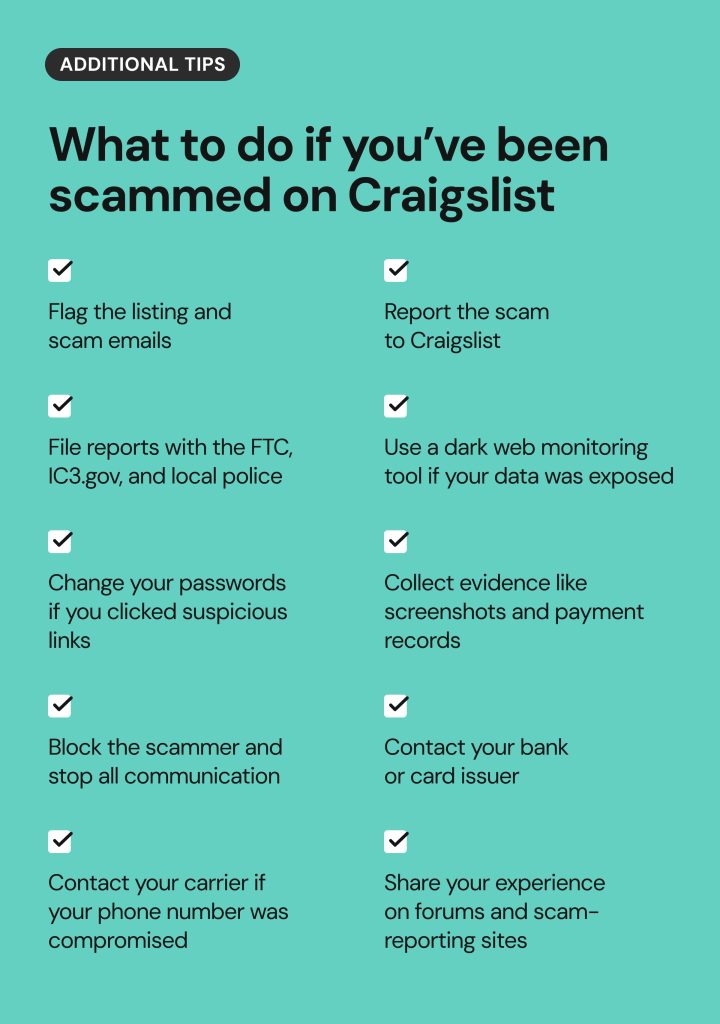
FAQs
Can you get scammed as a seller on Craigslist?
Yes, Craigslist sellers are frequent scam targets. Common scams include overpaying with fake checks, asking for verification codes, launching phishing attacks via Craigslist scam emails, and insisting on using third-party services of “couriers” or “movers.”
What are the red flags of a Craigslist scam?
The telltale signs of a Craigslist scam include offers that are too good to be true, refusal to meet in person, requests for advance fees via Zelle, Cash App, Venmo, crypto or gift cards, asking for personal information and verification codes, using urgency and emotional stories, as well as emails with links that redirect to payment pages or Craigslist’s login page, which are most likely to be spoofed.
What can a Craigslist scammer do with my phone number?
Scammers can use your phone number to attempt Google Voice hijacking by tricking you into sharing a verification code, send phishing links to steal your sensitive information, attempt social engineering to get more personal information from you, including for identity theft purposes, and sell your number to other scammers on the dark web.
How do I report a scam or fake post on Craigslist?
If you come across a Craigslist post you believe is a scam, fill out the scam report form found in the platform’s contact details. You should also flag suspicious listings and associated emails. Flagging acts as a signal to Craigslist, and after a certain number of flags, the listing gets removed from the platform. If you’ve become a victim of a Craigslist scam, you should also report it to your local anti-fraud authorities, such as the Federal Trade Commission (FTC) in the U.S. or the Canadian Anti-Fraud Centere.
Is it safe to use Zelle, PayPal, or Venmo for Craigslist transactions?
Generally, no. These platforms, except for PayPal, are designed for peer-to-peer transactions between people who know and trust each other. Transactions are typically irreversible and difficult to dispute, especially if you authorized them. PayPal offers buyer protection only if you use PayPal Goods & Services, but scammers often forge PayPal payment confirmations or fake screenshots to trick you into believing you owe additional fees.




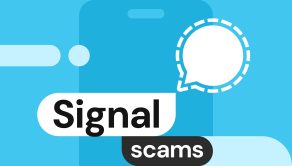
Dimitri is a tech entrepreneur and founder of Onerep, the first fully automated data removal service. Top cybersecurity CEO of 2021 by The Software Report.